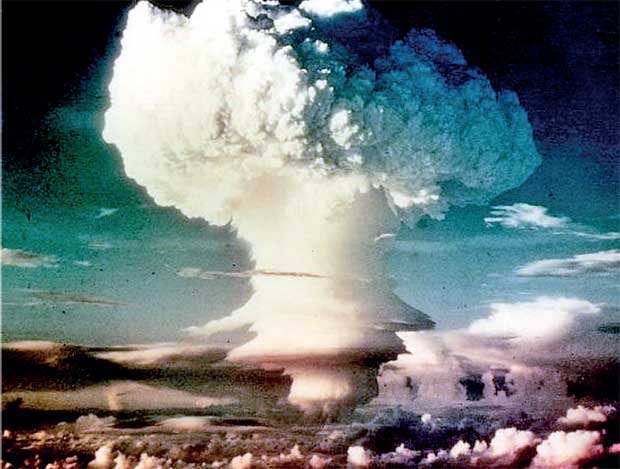11 Jul 2017 - {{hitsCtrl.values.hits}}

Following both World Wars, several global initiatives came into effect in a bid to ban the testing and non-proliferation of nuclear weapons. These include conventions such as the Treaty Banning Nuclear Weapon Tests in the Atmosphere, in Outer Space and Under Water (1963), the Comprehensive Nuclear-Test Ban Treaty (1996), the Treaty on the Non-Proliferation of Nuclear Weapons (1968) and the International Convention for the Suppression of Acts of Nuclear Terrorism (2005).
Nevertheless, none of the above legislature supported the total ban of nuclear weaponry nor worked  towards eliminating such material from earth. States and non-state parties to nuclear-related conventions have hitherto been amassing and testing modern, advanced nuclear weapons which are a thousand times more powerful and destructive than the ones used by the US to attack Japan in 1945.
towards eliminating such material from earth. States and non-state parties to nuclear-related conventions have hitherto been amassing and testing modern, advanced nuclear weapons which are a thousand times more powerful and destructive than the ones used by the US to attack Japan in 1945.
The US dropped its mighty nuclear bombs on the Japanese cities of Hiroshima and Nagasaki in 1945, killing hundreds of thousands of innocent beings, severely damaging natural resources and destroying vehicles and buildings to smithereens. Even after 70 years, many generations suffer the aftermath of the grisly attack. If a nuclear war were to take place in the present day, one would be unable to assess the level of damage it would bring.
"Even though Sri Lanka is not a nuclear power, the country has been in the forefront of nuclear and disarmament initiatives. Sri Lanka has been a signatory for the aforementioned conventions, and has assumed leadership from the very inception"
However, the growing influence of the civil society on international peace and humanitarian space was witnessed during the past few decades. Its successful efforts to suppress in-discriminatory constituents and to regulate conventional weaponry have given leadership to ban Anti-Personnel Landmines through the Anti-Personnel Mine Ban Convention - APMBC (1997), Cluster Bombs through the Convention on Cluster Munitions – CCM (2008) and regulating of conventional weapons through the Arms Trade Treaty – ATT (2013).
In addition to this, the United Nations Convention on the Rights of Persons with Disabilities –UNCRPD (2007), an effort to protect the rights and dignity of persons with disabilities, came into being
Inspired by APMBC’s efforts to protect the rights and dignity of persons with disabilities, the United Nations Convention on the Rights of Persons with Disabilities –UNCRPD (2007) was formed. The civil society played a pivotal role in UNCRPD negotiations.
The APMBC, CCM, ATT and CRPD are by far the most effective conventions at the UN. Lately, the civil society led the campaign to ban nuclear weapons and engaged in negotiations with governments and UN agencies, thus giving birth to the Nuclear Ban Treaty.

Even though Sri Lanka is not a nuclear power, the country has been in the forefront of nuclear and disarmament initiatives. Sri Lanka has been a signatory for the aforementioned conventions, and has assumed leadership from the very inception. At one time, Sri Lanka was called the ‘Champion of Disarmament.’
Sri Lanka always followed a non-aligned foreign policy to achieve this success. This has never hindered its bilateral and multilateral ties with its neighbours such as India and Pakistan, or even nuclear powers like the USA, Russia and China.
From 2005 onwards, Sri Lanka had not acceded to any disarmament convention, claiming that the country was engaged with protracted armed conflict with the LTTE until 2009. During warfare, several countries have acceded to the above conventions to gain benefits, and these include supporting peace initiatives. Even after the war, Sri Lanka did not accede to any disarmament convention, but the previous government had agreed to accede to conventions like the APMBC and CCM. However, they were not able to accede to any such condition.
With the change of government in January 2015, there is renewed hope for Sri Lanka that the country will accede to the above conventions. Representatives of the Sri Lanka Campaign to Ban Landmines (SLCBL) met President Maithripala Sirisena in December 2015 and explained to him the significance of Sri Lanka’s accession to the APMBC and CCM and the ratification of the CRPD. They also presented him with related publications. Later in February 2016, the country ratified the CRPD and in March the same year, the Cabinet of Ministers decided to support Sri Lanka’s accession to the APMBC. Both actions were well-received by the local and international community, but Sri Lanka has yet to accede to the APMBC.
Sri Lanka recently voted for the NBT, breaking more than a decade of closed-door policies in a world of disarmament. If Sri Lanka accedes to the APMBC and CCM with other conventions in September this year, President Sirisena will be the first Head of State to deposit more than three conventions -- NBT, APMBC and CCM -- at the UN Secretary General’s office during the UNGA meeting in New York. Apart from the various other benefits, this will make a pathway for Sri Lanka to become a ‘soft power in the region’ as well as to bring back the old glory of being a ‘Champion of Disarmament.’ This golden opportunity will not occur in the foreseeable future for any other leader or country and Sri Lanka should not miss this opportunity.
29 Oct 2024 29 Oct 2024
29 Oct 2024 29 Oct 2024
29 Oct 2024 29 Oct 2024
29 Oct 2024 29 Oct 2024
29 Oct 2024 29 Oct 2024